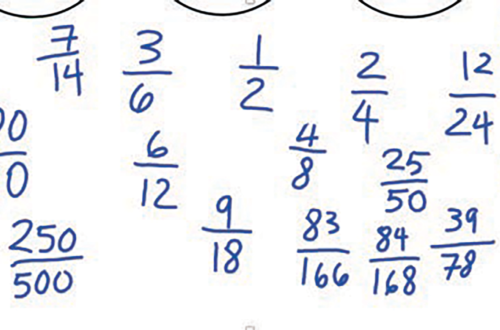Journal of the Mathematics Council of the Alberta Teachers’ Association
Volume 10 Issue 2, February 1971
From the Editor’s Desk
Recently a document came to our attention which summarizes, in a very general way, researchers’ latest answers to certain questions dealing with elementary school mathematics. We wish to share some of these findings with you.
Do elementary students like mathematics? It is a widely accepted notion
that mathematics is disliked by most students; however, results of numerous surveys contradict this. Many studies show that students frequently select arithmetic as their favorite subject.
What effect does the mathematical knowledge of parents have on the mathematical knowledge of their children? Research studies have found that increased parent knowledge of mathematics or classroom activities resulted in a higher achievement by students.
What steps can be taken to motivate the student in mathematics?
- Verbal praise aids motivation and achievement.
- Use of mathematical games aids motivation.
- Reinforcement increases achievement in arithmetic.
Research findings on materials indicate that concrete materials should be used before proceeding to abstractions. The reading level of many arithmetic textbooks is too difficult.
Practical mathematics. Counting money and telling time are the most frequent out-of-school uses of arithmetic skills by students. Practical problems of interest to students promote greater achievement in problem-solving.
Research findings on mathematics operations indicate that drill and practice are necessary for computational accuracy, but they should be used only after effective developmental activities.
Research on organization and classroom management indicates that the type of classroom (departmentalized, team teaching, open area, egg-crated) apparently does not affect achievement. Grouping is desirable, especially within a class.
On students and teachers, research shows that students have more positive
attitudes toward arithmetic when they perceive it as a useful skill, with practical values for out-of-school situations. Socioeconomic level affects background and achievement, but not so much in mathematics as in certain other curricular areas. The mathematical competency of teachers is still inadequate, but is improving.
Finally, the research indicates that inductive discovery strategies are effective, especially for retention and transfer.
For more information, the reader is referred to the original document, which is available from ERIC Reproduction Document Service, under identification number ED 034 087.
Murray R. Falk
1 – 2
Dr. Werner Liedtke
3
Murray R. Falk
4
Curious Reader, B. MacInnis
5 – 7
Open-ended Explorations for your Math Corner
Nancy T. Hildebrand
7
Editor Murray R. Falk
8
First announcement of a new Journal: MATHEMATICAL PROGRAMMING
Professor M.L. Balinski



